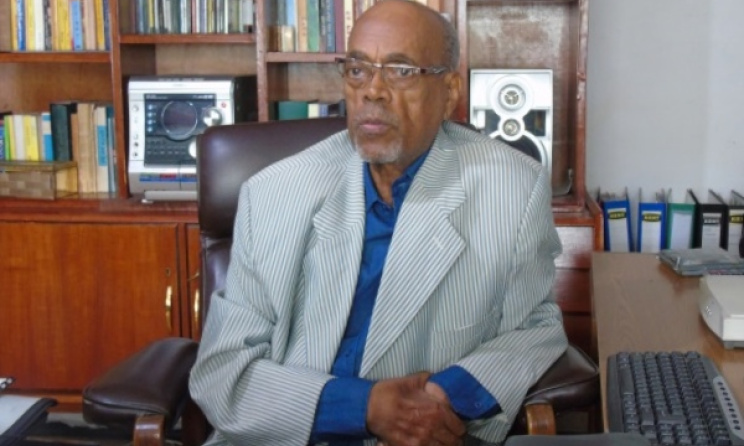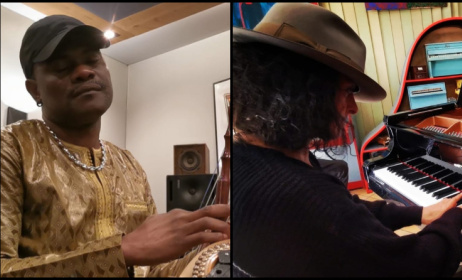Amha Eshete: Pioneer of Ethiopia's music industry
In his book Abyssinie Swing: A Pictorial History of Modern Ethiopian Music (2001), Francis Falceto notes that audiences tend to remember the names of great singers or soloists rather than those of their producers. In Africa, perhaps even more than elsewhere, producers are often the forgotten lot. In Ethiopia, however, one man’s ingenious defiance of authority ensured that Ethiopian tunes were heard the world over. That man is Amha Eshete, the founder of Ethiopia’s first recording label, Amha Records.
 Amha Eshete, Ethiopia's pioneer music publisher and distributor. Photo: Arefaynie Fantahun
Amha Eshete, Ethiopia's pioneer music publisher and distributor. Photo: Arefaynie Fantahun
Addis Ababa in the 1960s was about to become a hotbed of musical creativity as Western blues began to catch on in the city. Urban sophistication started to create an appetite for modern music and the burgeoning sounds of American blues, soul and rock ‘n’ roll were filtering onto Addis Ababa radio. But it was not always easy to get hold of the records for youngsters of the city. During those times, the people who were engaged in importing and distributing music records were foreigners.
“Central was one of the music stores at the time. Located right in front of Trianon Bar in the centre of Piazza, the shop was owned by an elderly Italian man whose musical choice was not in tune with the emerging trends of the day and he was not open-minded,” remembers Amha Eshete. He was 24 years old at the time, and like many young Ethiopians was a music fan. The ambitious Amha seized the initiative to open a new shop and began importing the latest western popular music, which took Addis by storm.
Now in his 70s, the once energetic Amha is weighed down by the Guillain-Barré syndrome (a rare auto-immune disorder that causes paralysis), which he was diagnosed with some ten years ago. His body won’t cooperate and he relies on support to get around. Despite his illness, Amha still has a remarkable clarity of mind when recalling the evens that led to him starting his own store. "The kind of music imported wasn’t to my taste," he says with a buoyant rise in his voice. “After completing high school, I was seeking ways in which I could get albums that appealed to me and my friends. There were three other music shops, run by either Armenians or Greeks. The music business at the time was dominated by foreigners, leaving Ethiopians feeling excluded.”
To satisfy their musical needs, most Ethiopians had to listen to the Voice of America (VOA), although Amha notes that the reception left much to be desired. Later on he got an opportunity to go to Eritrea for a mapping mission with Americans, deepening his musical curiousity. At the American base was the Kagnew Station, which played the latest American music. “I used to spend hours lost in the rhythms booming from the radio. It was the best it could be; the DJs were so sharp. It was a far cry from the music played on the radio in Addis Ababa. In terms of American music's availability, Eritrea’s capital city Asmara was far ahead of Addis Ababa,” he recalls.
To bridge the gap, Amha explored ways to make the music he heard available to Ethiopians. “I was inspired and started doing more research on importing music, but the business looked beyond our reach,” he says. He soon learnt that it was possible to import music directly from the US, so he found a space where he could set up a shop in Arada, one of Addis's subcities. “A generous tailor allowed me to share his space. I only had 500 birr (about $22 today) in savings. When my first order arrived, I needed money to pay for the records and customs. Even though I had relatives who were well off, they could not lend me the capital I needed. To them the music business was not as lucrative as the coffee trade,” Amha says with a chuckle. A friend believed in him, however, and that's how his music shop, Harambee, emerged as one of the small businesses that lent colour and texture to life in the city.
His first shipment was a success. Immediately after the records hit the shelves, young and middle-aged people started flocking to the music shop. By midday on the first day of business, half the merchandise had already been sold. “People were thirsty for the hottest acts - James Brown, Jim Reeves, Otis Redding, Wilson Pickett and others. Word of mouth led to bigger clients. Amha paid off his debts and ordered more records. He was now in business.
When the sales kept coming, he decided to expand his business to a second shop at Piazza. He also opened shops in other towns such as Nazareth and had agents in Asmara and Dire Dawa.
The formation of Amha Records
With time, young Amha widened his network and the business grew beyond anything he had envisioned. He imported music from Kenya, Sudan, West Africa as well as India. “Sudanese music was getting very popular, particularly Mohamed Wordi’s. I was well off financially from the sales,” he says. But a question kept popping into his mind: what about Ethiopian music? The idea of producing local music had been fermenting in his mind. “In parallel with my work of importing and distributing, I decided to involve myself in this project: producing Ethiopian music.”
This wasn't easy, however. Amha came to learn that there was a 1948 Imperial edict that granted a monopoly in music publishing and distribution to Hager Fikir Theatre. The Emperor, after his return from exile, gave the right to this association because it had not received any government subsidy. Even with the monopoly as Ethiopia’s only music publisher, Amha learnt that the theatre had not produced anything in 20 years, other than the Emperor’s 25th anniversary jubilee!
Venturing into music publishing therefore meant risking opposition from authorities. “Looking back, it now sounds foolhardy that I even thought of doing that. Officials who worked at Hager Fikir Theatre and the National Theatre had done their best to talk me out of the project.” Determined, Amha believed he could break the rules with impunity. Holding out against all odds, he started looking for partners and approached many singers. Understandably, most were reluctant, except for one: Alemayehu Eshete, who was willing to take up Amha’s offer. They immediately hit it off.
Amha Records' breakthrough recording was a 45rpm single featuring Alemayehu Eshete’s ‘Timarkiyalehs’ and ‘Ya Tara’ (intended for Sudanese listeners) on the B-side. Released in 1969, the single was manufactured in India and distributed by Harambee Music shop. A second single, containing Alemayehu’s ‘Lib Tatefalech’ with ‘Honey Baby’ on the B-side, was released later that same year. When the pair played it on a loudspeaker from Amha’s shop, young people began dancing on the street, stopping traffic. “The streets were basically blocked," recalls Amha. "This was a miracle!”
Beyond his ability to develop talent and give exposure to artists, Amha possessed a keen eye for executive talent, grooming scores of young agents over the course of his career and playing a pivotal role in the growth of the Ethiopian music scene. He recorded 103 singles and 12 LPs by Ethiopian artists between 1969 and 1975. His flair for promotion helped some of the greatest talents of the era get a headstart in the industry. Besides Alemayehu Eshete, legends like Mulatu Astatke, Girma Bèyènè, Tesfamariam Kidane, Teshome Mitiku, Getachew Kassa, Seifu Yohannes were among those who benefited.
Most of the music sold well during that time. The biggest seller was Getachew Kassa’s Tizita, which sold close to 5 000 copies. Motivated by this success, numerous local recording companies started to emerge, paving the way for the birth of Ethiopia’s recording industry. For many, Amha's early productions made him part of a small group that changed the course Ethiopian music history. Falceto highlights other independent producers such as Kassahoun Eshete (Philips Ethiopia) and Ali Tango (Kaifa Records) as those who carried on the work started by Amha. “Their productions constitute nothing less than the memory of an era - and an admirable legacy left for posterity,” he writes.
Amha himself is reluctant to make such claims, but he freely discusses how much those times meant to him, particularly the friendships he nurtured with many musicians. To this day, Alemayehu, Mahmoud Ahmed and many others remain close friends. “One of the best-selling artists of the time was Alemayehu Eshete. He was my first client. He and I are musical and artistic comrades. Our connection was fraternal. Since we have the same surname, people think that we are bothers, but all we shared was mutual dreams, driven by impulses."
Amha says he was pleased when in 2007 Mahmoud Ahmed was honoured with a BBC Radio 3 Award for World Music. He is also proud of his role in helping to increase the pay for musicians. For example he remembers paying Ahmed 2000 Birr (about $91 today) for a single recording in 1974 - a far cry from the convention at a time then payment for most musicians was meagre. The average pay even for established singers then was around 200 Birr ($9) per month. Amha's generosity made Ahmed the highest-paid performer in Ethiopian music at the time.
Amha successes are not without some regrets, however. He says one of his biggest regrets was not producing for famed female vocalist Bizunesh Bekele, regarded as the 'Aretha Franklin of Ethiopia'. “We were close friends,” remembers Amha. "I really admired her voice and character. She was phenomenally talented; the type of singer who would just hum for you in the middle of conversation. We had planned to do her records but I feel sad that the project did not come to be." Bekele passed away in 1990.
Already a successful music producer and importer, Amha entered the live entertainment realm in 1968 when he formed the Soul Ekos band[i], comprised of vocalists Alemayehu Eshete and Teshome Mitiku along with Alula Yohannes (lead guitar), Tamirat Ferenji (trumpet), Messele Gessesse (drums), Tekie Adhanom (guitar) and Tewdros Mitiku (saxophone). The group was a big success, putting out hits like Seifu Yohannes’s ‘Ebo Lala’ and Teshome Mitiku’s ‘Gara Sire New Betish’. The band was in constant demand for various occasions, such as weddings and the opening of the Hilton Hotel in Addis Ababa.
“The most important thing was that musicians got the freedom to be themselves," remembers Amha. "They had their own salary. I rented a villa where they would rehearse. We had a booking office near the Tea Room in Piazza. We were invited to other towns, such as Wonji and Asmara.”
Amha recalls one of the band's members, Seifu Yohannes, who died at barely 30 years of age. “That was one promising artist. He was destined to do great things. He had a gorgeous voice, even without a microphone. His vocals were impeccable. I wish he had more years to record music for Ethiopians."
Life in exile
The events of 1974 could not have prepared Amha for what was to come. The political winds of change - the civil war that followed the coup by the Derg regime - dashed the hopes of Ethiopia's music industry that had steadly been making headway. Amha did not suspect his label and his band would be the victim of a revolution that had promised better times. “We actually thought that something good was coming," he recalls. "We never thought things could get worse. I was one of those people who gave a bouquet of flowers to the newly arrived soldiers, thinking that they liberated us from the repressive regime.”
Like many others, Amha was driven into exile. “I headed to Greece the year the Emperor was deposed to record Tilahun Gessesse, Tekele Tesfageize, Alemayehu Eshete and Muluken Melesse. When I sent the records home, even though censorship had been approved in advance, Tekele’s Tigrinya lyrics were rejected at customs for political reasons. It was considered to be so serious an offense in the eyes of the regime that the official in no time put the singer, the soundman and my father by proxy under arrest! I was informed about it and advised to stay there, which I did.”
The first few months alone took a toll on his marriage, which ended in divorce. Little did he know at the time that this exile would stretch to 19 years.
During his years in exile in the USA, Amha retained some semblance of sanity by running a club and restaurant. For two decades the Blue Nile club reigned supreme as one of Washington DC's most popular nightspots, a platform for many exiled artists. He also founded Ibex, a triple-storey nightclub that showcased Ethiopian as well as American artists. “The first floor was for Ethiopian musicians. The second floor was for live music and jazz. The third floor was a discotheque with a famous DJ," he explains.
In 1981, Amha arranged for a full band that included Mahmoud Ahmed, Getachew Kassa and Girma Bèyènè to tour the US, giving the group of Ethiopian stars their first American exposure at a time Ethiopian's military regime was strongly condemning American imperialism. The group's first performance was at Washington DC’s famous Warner Theatre. “It was an expensive venture and a logistical feat,” recalls Amha.
One of Amha’s most rewarding moments came when some of his original vinyl releases were included on the Ethiopiques series compiled by Francis Falceto, who took it upon himself to track Amha down in the USA in the hopes of convincing him to reissue his collection, the master tapes of which were located in Greece. “I can’t tire of talking about him," says Amha. "No one else has done what he has been able to accomplish to enrich our understanding of Ethiopian music. I could go on talking about him for hours on end. He put a lot of dedication into the project. As there was no internet when he started, we did the bulk of communication through telefaxes. At times I was tired of getting his memos and faxes, but all the interviews he gave was with the aim of promoting Ethiopian music. Given the intensity with which he devoted himself to his cause, I knew what we wanted to achieve would one day come to fruition.”
Amha's legacy
With five decades of experience in the music industry, Amha has left an indelible mark on Ethiopian music - as a retailer, producer, publisher, distributor, promoter and mentor. After years of struggle, Amha knows he is fortunate. "I didn't know anything about this business; I learned the trade by trial and error. I never took it for granted. I just took it a day at a time."
Girma Bèyènè, Amha's long-time musical associate, has nothing but praise for the man who opened up Ethiopia’s recording industry. “Amha and I were first introduced to each other in 1969 in Addis Ababa by Alemayehu Eshete,” he says. "I was struck by his youth yet how committed he was. Our first opportunity to work together was when we did Alemayehu’s tracks. Later we became good friends. Actually he was my boss, I still regard him as such."
Girma’s four early tracks - ‘Yebekagnale’, ‘Seit Alamenem’, ‘Enken Yelelebesh’ and ‘Ene Negne Bay Manesh’ - were recorded by Amha in 1969. They paved the way to a successful career, as Amha did for countless other Ethiopian artists. Although the sixth Ethiopian Music Festival, staged in 2007 by the Alliance Ethio-Française, was dedicated to Amha, Girma feels that this giant of Ethiopian music has still not been given the recognition he truly deserves.
References
- Falceto, Francis. 2001. Abyssinie Swing: A Pictorial History of Modern Ethiopian Music. Shama Books.
- Interview with Amha Eshete, April 2016.
- Interview with Girma Beyene, 18 June 2016.
[i] www.tadias.com/08/05/2010/exclusive-interview-with-ethiopian-legend-teshome-mitiku/
























Commentaires
s'identifier or register to post comments